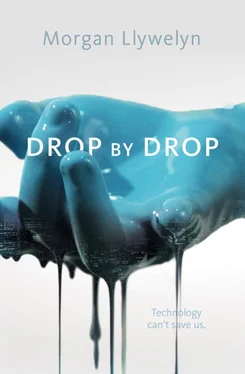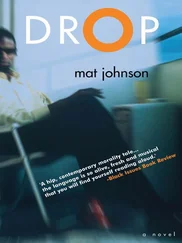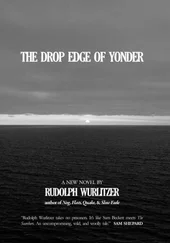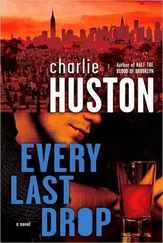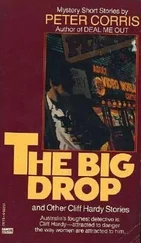“Don’t forget about cars,” said Gerry. “Under the hood some now have enough electronic gadgetry to send a rocket to Mars.”
A muscle twitched in Jack’s jaw. “I’m not going to stop driving my Mustang.”
“It’s a classic car, isn’t it? Don’t they predate computerization?”
“Just barely. How much do you know about cars, Gerry? They started using computers in them before the turn of the century. If mine was a vintage automobile like one of the 1950 Mercs, it wouldn’t matter.”
Gloria spoke up. “So much medical equipment depends on computers too.”
“Except bedpans, Muffin.”
“Even bedpans. Their computers weigh output and report it to the nurses’ station.”
“Too much information,” said Jack Reece.
* * *
Edgar Tilbury visited his wife’s grave every Sunday. He did not comfort himself with the thought that Veronica was looking down on him; he did not believe in an afterlife. But he went to Sunnyslope Cemetery in every sort of weather and sat on a wrought-iron bench a few feet from her headstone. Sometimes for only ten minutes but never more than an hour. Then he would drive home again, a long, silent drive into deep country.
After leaving the cemetery that morning he saw the young woman. At least she looked young to him. She wore a poncho and carried a buckskin shoulder bag, and was standing by the bus stop.
None of my business, he told himself.
As he drove past he glanced in the rearview mirror and saw her face.
He slowed. Stopped. Backed up and lowered the window. “Want a ride?”
She didn’t look at him. “No.”
“Got it.” But he didn’t drive on. “You been to the cemetery?”
“My mother’s buried there.”
“You don’t remember me, do you?”
“Should I?” Still not looking at him.
“I remember you,” Tilbury said.
“Do you.” A statement, not a question. She was looking at him now. Warily.
“It was a morning like this one, nice and dry. But your clothes were soaked.”
“You were kind to me.”
“You were dizzy and covered with bruises.”
“So you took me home with you.”
“You were only a kid; I never laid a finger on you.”
“No, you didn’t.” She bent to look in the window without touching the car. “You look older now, Edgar.”
“I am older. So are you.”
A faint smile ghosted across her lips. “A thousand years older.”
He touched a metal button on the dashboard. The door on the passenger side clicked. “Get in if you want to, Lila.”
“You still live in the same place?”
“I do, but it’s been extended; kind of unusual if you like that sort of thing.”
She opened the door. “I’d like to see it.”
“Come to lunch now and I’ll give you some of my Blow-Your-Socks-Off Chili.”
“That I remember.”
Neither spoke for several miles until she asked, “What kind of car is this?”
“A hybrid.”
“I’ve been in a lot of hybrids and they’re nothing like this.”
“Mine’s part pickup truck and part Jeep; I put it together myself. It’ll run on gasoline or used cooking oil or rubbish I find lying by the road.”
“Are you still making reproduction carriages, Edgar?”
“It’s a profitable hobby. Nostalgia sells. I just built a little trap that’s supposed to be a surprise birthday present, and I have a brougham about half finished that really is beautiful. It would suit you, I think.”
“Is that what you put on your tax forms? Occupation, carriage maker?”
“What makes you think I file tax forms? I keep my assets in a hole in the ground.”
Tilbury’s hybrid turned off the main road, drove over a rusty iron cattle guard and jolted down a rutted laneway. The fields on either side were pastureland sparsely studded with boulders. “You called them ‘remnants of the Ice Age,’” Lila remarked.
The lane curved to the right. The view ahead was blocked by a dense stand of cedars. Beyond them was a rambling white frame farmhouse with the upper part of a storm cellar protruding from one side. The building nestled in a haphazard mix of evergreen and deciduous shrubbery that had not been pruned in years.
“Home sweet home,” Tilbury announced. “Come on in.”
The living room was papered in a muted blue-and-white stripe; the brick fireplace smelled of ashes. Bookshelves were crammed with volumes on every imaginable subject, arranged according to topic. Two full sets of encyclopedias, one American and one British, took up a whole shelf by themselves. A well-worn recliner upholstered in coppery velour waited beside a large floor lamp.
Lila recalled that Tilbury had been a widower, but in this room there was no visible hint of his personal life. No framed photographs, none of those flourishes described as “a woman’s touch.”
“You still don’t have a dog, Edgar?”
“Had two since you were here. One got run over on the road, the other got shot for a sheep killer.”
“Was it a sheep killer?”
“Nope. But the guy that shot him hasn’t shot anything since. Would you like a drink before we eat?”
“Irish whiskey, right?”
“You have a damned good memory,” he said.
“Thanks.”
“You’re economical with words, aren’t you?”
In response she quoted, “‘Listen to everything, learn a little, answer nothing.’”
He gazed at her in astonishment. “Aristotle?”
She smiled. “Euripides.”
They sat with their drinks on either side of the fireplace. After a while Tilbury cleared his throat. “Under the circumstances I’d like to hear the rest of your story, Lila. If you think I’m entitled to that much.”
She gave him a measuring look. Slowly, some of the hard knots loosened inside her. It was getting too painful to hold up the shields which had protected her since childhood.
“Did I tell you about the party?”
“Just that it got too rough and some bastard who wouldn’t take no for an answer hit you. Hurt you pretty bad.”
“Knocked me out, I think, then threw me into the river. Maybe he thought I was dead; it’s lucky I didn’t drown. By the time I crawled out of the water he’d disappeared. Instead of going back to the party I just started walking.” As she talked the words came more easily. “I was like a moth coming out of a cocoon. Dazed, you know?”
“I can imagine.”
“I realized I’d been close to dying and I wasn’t ready for that. I never knew who my father was, but I knew what my mother was and I didn’t want to turn out like her.”
“So you kept walking until I found you,” Tilbury finished for her. “Buddhists would call that karma. We’d both had some life-changers, Lila; I’d buried my wife and you needed a fresh start. You know what? Every life’s a hallway with a certain number of doors in it. When you go through one you can either leave it open or close it behind you. I tend to close ’em.”
“So do I.”
“Obviously. You stayed with me for three weeks and then left without saying good-bye. After you’d found the cash I kept hidden,” he added.
The wary look returned. “I’m sorry about that. I just… I was still running, I guess.”
“Survival instinct; that’s something I understand. Yet here you are after all these years. Why come back when you’d got away clean?”
“I had the best reason in the world to come back to Sycamore River,” Lila told Tilbury, “at least I thought I did. I was going to make a dream come true.” She hesitated, deciding how much to reveal. “After I dropped out of school…”
“How old were you when you did that?”
“Eleven.”
“Was school too hard?”
Читать дальше
